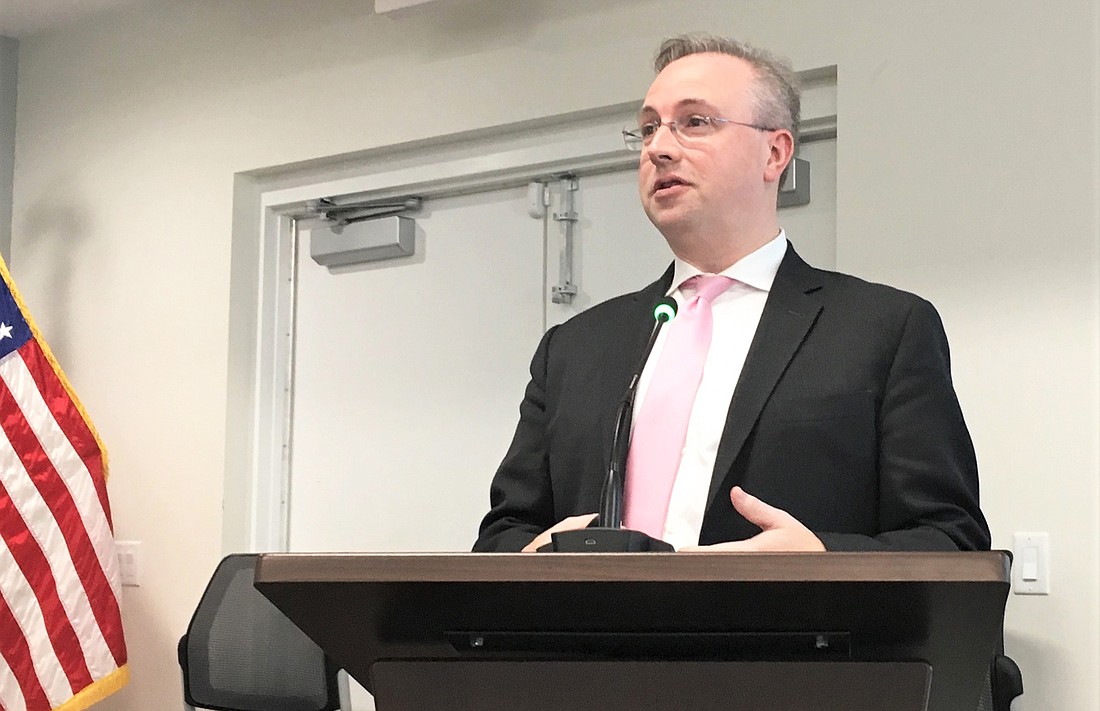
The housing shortage, affordable housing and increasing concerns for an economic recession led a Profit & Politics presentation Tuesday at the Northeast Florida Builders Association.
About 80 people attended the program about the national, state and local housing markets and the economy. The event was sponsored by Wells Fargo.
After nearly two decades of growth in consumer confidence, the economy is leveling off, said Robert Dietz, chief economist for the National Association of Home Builders.
The good news is “the economy is really solid,” Dietz said. There’s a rising number of jobs available, many of them unfilled due to the demographics of retiring baby boomers, and consumer spending rose in the second quarter of 2019.
At the same time, the country’s economic expansion is more than a decade old, Dietz said, noting that’s a long period of growth.
In addition, the 10-year Treasury note has fallen below the federal funds rate, which is a recession indicator, and gross domestic product is expected to slow down to 1.9% in 2020 and 1.5% in 2021, he said.
Dietz said he’s more cautious for 2020 and 2021 than he was for 2019.
He predicts a “growth recession,” not a severe downturn like what occurred in 2008, but a slowdown like the country experienced in 1998.
“This growth expansion still has some legs to it,” Dietz said.
Meantime, population growth in Florida, and Jacksonville in particular, is three to five times the national average, Dietz said, creating great demand for housing.
In the past year, the number of single-family building permits issued in Jacksonville exceeded the statewide average, with a 4.3% growth rate.
Also, Jacksonville’s multifamily building permits have increased since 2010, with permits issued for about 4,500 units in 2018, slightly below the state average.
Dietz said the local and national housing shortfall can’t be handled by rent control. “The only way is to build homes and apartments,” he said.
However, with opportunities come challenges.
Construction labor shortages continue, causing construction sector productivity to lag behind the overall economy, Dietz said.
Nationally, there were 373,000 construction positions open in July. In addition, construction costs have risen.
Despite having recovered from a spike last year, the cost of lumber is higher than it was in 2016, and regulatory costs as a share of a home’s price are rising substantially.
Nonetheless, Dietz said, interest rates are good and consumers have room for growth.
“This is a really great time to buy,” he said.
Affordable housing, fraud law concerns
Rusty Payton, chief executive officer and chief lobbyist for the Florida Home Builders Association, expressed frustration with a state government that he said fails to recognize the need for affordable housing.
“We are the only group that cares about the cost of a house,” Payton said. “It’s shocking to me.”
Payton also discussed a new contractor fraud law that makes it easier to prosecute contractors who take money but don’t do the work.
The law, which went into effect in July, pertains to consumers who pay a contractor more than 10% of the contract price for a home improvement project in advance.
Under the law, the contractor must apply for permits within 30 days. Once permits are issued, work must begin in 90 days, or the customer can begin to take action.
In some cases, the contract may contain unachievable deadlines, Payton said. He suggested contractors work with their lawyer on a contract that provides ample time to meet their deadlines.
Payton also mentioned the certification for Florida Master Builder, a higher standard of construction licensing that launched this year, saying it’s popular with clients as well as homebuilders, remodelers and commercial contractors.
“It’s a great tool to set the bar higher for the industry,” Payton said.